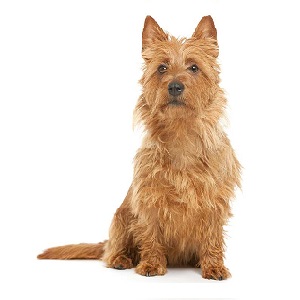Are Australian Terriers Good For Apartments?
Are you living in an apartment unit or flat and thinking to adopt an Australian Terrier and want to know whether an Australian Terrier Dog is suitable for your apartment?
Well, Australian Terrier scores  out of 5 in the scale of apartment friendly dogs when it comes to other dog breeds.
out of 5 in the scale of apartment friendly dogs when it comes to other dog breeds.
Can Australian Terriers Be Apartment Dogs?
-
The Australian Terrier is good for apartment living. It is fairly active indoors and will do okay without a yard provided it is taken for walks on a lead. They should not be allowed to roam free because they have a tendency to chase.
Best 5 Apartment-Friendly Pet Dog Breeds
Personality, bark-levels and a low-energy count are all good traits to look for when on the hunt for an appropriate apartment canine. Below is a list of the best apartment frinedly breeds.
1. English Bulldog - Despite appearances, the English Bulldog is a cheerful dog that is more than happy to spend their days napping on the couch. They will barely bark, and are fantastic with children in spite of their stocky build which has them weighing upwards of 22kg!
2. Pug - Love them or hate them, the humble pug is a playful and loyal dog. Pugs are a social breed, so their perfect home would include another dog or lots of human interaction. The pug is satisfied to laze about all day, making him the perfect apartment friend.
3. Chihuahua - While the Chihuahua calls for minimal exercise, making it perfect for a small home, it is very vital that they receive proper training to avoid the yappy character they are known for. Weighing as little as 1kg, they are easily carried around which is handy for individuals who travel.
4. Dachshund - Also known as the 'sausage dog', this friendly breed is quite great with other pets and children. While they can initially be somewhat challenging to train, they only need a small amount of exercise, due to their tiny legs!
5. Boston Terrier - Another breed great due to their size, the Boston Terrier will require a daily walk to stay happy, but they can be fantastic, affectionate breed who will remain mostly inactive while indoors.
What to do if you lose your Australian Terrier
If your Australian Terrier Dog or any other pet has gone missing and it does not have an identification tag with a phone number, you can:
1. List your missing pet details at Pet Reunite website here.
2. Report the missing pet on the Local Facebook Lost Pets Groups Here.
3. Visit the nearby vet clinics to see if anyone has handed in your lost pet.
4. Phone the RSPCA or Visit the RSPCA Lost Pets website and complete a Lost Pet Report.
5. Visit Lost Pets Pages of Animal Shelters.
What to do if you find a lost Australian Terrier
If you find a Australian Terrier Dog or any other pet and it does not have an identification tag with a phone number, you can:
1. List the found pet details at Pet Reunite website here.
2. Report the missing pet on the Local Facebook Lost Pets Groups.
3. Contact the Local Authority to collect the lost animal.
4. Take the pet to the local Animal Shelter near to your suburb.
5. Take the pet to the local Vet Clinic who can scan the animal’s microchip and phone the registered owner of the pet.
Laws Regarding Missing Pets
1. It is against the law to keep any animal that you find.
2. Pets are generally considered property and it is illegal to take and keep someone else’s property.
3. You must call your local animal control unit and file a FOUND AN ANIMAL report for any dog or cat you find.
4. To reclaim your lost dog, cat or other pet from the animal shelter you must pay a release fee.
5. If your dog or cat is unregistered, you will have to register your pet before you can take it home.

